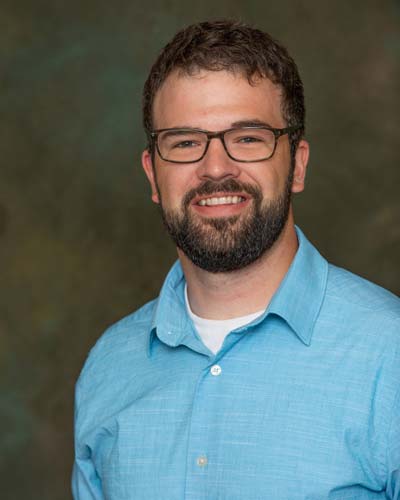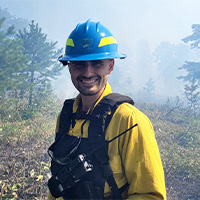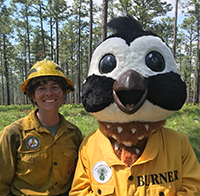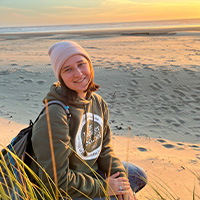Faculty Profile
Andrew Vander Yacht


Assistant Professor
Department of Sustainable Resources Management
310b Bray Hall
Education
-
Ph.D. in Natural Resources, The University of Tennessee, 2018
-
Dissertation: Plant & Fuel Dynamics in Response to Canopy Disturbance & Season of Burn
-
-
M.S. in Wildlife Science - Statistics Minor, The University of Tennessee, 2013
-
Thesis: Vegetation & Wildlife Response to Oak Savanna & Woodland Restoration
-
-
B.S. in Biology - Environmental Science & Chemistry Minors, 2009
-
Undergraduate Research: fungal endophytes in grasses & field studies in East Africa
-
Research Interests
 I coordinate the Applied Forest & Fire Ecology Lab (AFFEL) at SUNY ESF which seeks to address threats to forest resources by: 1) understanding the effects of disturbance on forest structure, composition, distribution, & function, 2) integrating this knowledge into the design of modern forest management strategies, tactics, & tools, & 3) testing efficacy through application. In general, work in the AFFEL explores the hypothesis that disturbance is the key to forest resilience in the face of modern stressors. More specific interests within this broad theme include:
I coordinate the Applied Forest & Fire Ecology Lab (AFFEL) at SUNY ESF which seeks to address threats to forest resources by: 1) understanding the effects of disturbance on forest structure, composition, distribution, & function, 2) integrating this knowledge into the design of modern forest management strategies, tactics, & tools, & 3) testing efficacy through application. In general, work in the AFFEL explores the hypothesis that disturbance is the key to forest resilience in the face of modern stressors. More specific interests within this broad theme include:
- Mechanistic understanding of the forest mesophication process
- Restoring disturbance-dependent components of forest biodiversity
- Effects of disturbance on the adaptive capacity of forests
- Fire and fuel ecology and management in the Eastern USA
- Microbial plant-soil(-fire) feedbacks & forest regeneration
- Oak (Quercus spp.) and pine (Pinus spp.) ecology and silviculture
- Mechanical, chemical, and fire control of American beech competition
- Ticks, tick-borne disease, and prescribed fire management
- Relationships between pyrodiversity and biodiversity
- Effect of fire and forest management on forest hydrology
Teaching
- Forest Management and Wildlife (FOR 496)
- Fire Ecology and Management (FOR 496)
- Silviculture (FOR 334 or 534)
Prospective Students
My philosophy towards mentorship involves encouraging and enabling students to pursue their strongest interests and abilities as we codevelop innovative, rigorous, and applied research. If it appears our research interests align, please feel free to reach out via email ([email protected]) for more information. Funded graduate assistantships, and undergraduate research technicians, will be offered based on demonstrated academic excellence, related research experience, and passion for forest, fire, and wildlife management.
Selected Publications
* = advised graduate students. PI if last author.
*Legge, E.O., A. Koyama, C.W. Fernandez, K.E. Wood, N.J. Triviño Silva, L.A. Brudvig, & A.L. Vander Yacht. 2025. Dearth under earth: Understudied plant-soil-fire feedback as drivers of forest mesophication & oak regeneration failures. Forest Ecology & Management 597. 123147.
*Gilvarg, S.C., Leydet, B., Dovciak, M., Smith, A.M.S., Miller, D.L., Luckhart, S., Lashley, M.A., & A.L. Vander Yacht. 2025. Pyro-health synchrony: Integrating wildland fire into One Health to benefit plants, animals, ecosystems, and people. Bioscience. biaf068.
Vander Yacht, A.L., Gilvarg, S.C.*, Varner, J.M., & Stambaugh, M.C. 2024. Future increases in fire should inform present management of fire-infrequent forests: A post-smoke critique of “asbestos” paradigms in the northeastern USA and beyond. Biological Conservation 296, 110703.
Vander Yacht, A.L., Kobe, R.K., & Walters, M.B. 2022. Hardwood regeneration in red pine plantations: Thinning and site quality effects on changes in density and species composition from edges to interiors. Forest Ecology & Management 526: 1-29.
Vander Yacht, A.L., Keyser, P.D., Barrioz, S.A., Kwit, C., Stambaugh, M.C., Clatterbuck, W.K., & Jacobs, R. 2020. Litter to glitter: promoting herbaceous groundcover & diversity in mid-southern USA oak forests using canopy disturbance & fire. Fire Ecology 16:17 1-19.
Vander Yacht, A.L., Keyser, P.D., Kwit, C., Stambaugh, M.C., & Clatterbuck, W.K. 2020. Thresholds in woody & herbaceous component coexistence inform the restoration of a fire-dependent community. Applied Vegetation Science 23: 159-174. (Journal Cover Photo).
Keyser, P.D., Vander Yacht, A.L., Henderson, C.A., Willcox, E.V., Cox, M.R., Buehler, D.A., Harper, C.A., Kwit, C., & Stambaugh, M.C. 2019. Wildlife response to oak ecosystem restoration. In: Clark, S.L. & Schweitzer, C.J. (eds.) Oak symposium: sustaining oak forests in the 21st century through science-based management e-Gen. Tech. Rep. SRS-237. Asheville, NC: U.S. Department of Agriculture Forest Service, Southern Research Station. pg. 157.
Vander Yacht, A.L., Keyser, P.D., Kwit, C., Stambaugh, M.C., Clatterbuck, W.K., & Simon, D.M. 2019. Fuel dynamics during oak woodland & savanna restoration in the Mid-South USA. International Journal of Wildland Fire 28(1): 70-84.
Vander Yacht, A.L., Keyser, P.D., Barrioz, S.A., Kwit, C., Stambaugh, M.C., Clatterbuck, W.K., & Simon, D.M. 2018. Reversing mesophication effects on understory woody vegetation in Mid-Southern oak forests. Forest Science 65(3): 289-303.
Vander Yacht, A.L., Keyser, P.D., Kwit, C., & Stambaugh, M.C. 2018. Effectiveness of joint fuel treatments & vegetation management in restoring Eastern upland oak ecosystems. JFSP Project ID 13-1-04-14 Final Report.
Vander Yacht, A.L., Keyser, P.D., Harper, C.A., Buckley, D.S., & Saxton, A.S. 2017. Restoration of oak woodlands & savannas in Tennessee using canopy-disturbance, fire-season, & herbicides. Forest Ecology & Management 406: 351-360.
Vander Yacht, A.L., Barrioz, S.A., Keyser, P.D., Harper, C.A., Buckley, D.S., Buehler, D.A. & Applegate, R.D. 2017. Vegetation response to canopy disturbance & season of burn during oak woodland & savanna restoration in Tennessee. Forest Ecology & Management 390: 187-202.
Vander Yacht, A.L., Keyser, P.D., Buehler, D.A., Harper, C.A., Buckley, D.S. & Applegate, R.D. 2016. Avian occupancy response to oak woodland & savanna restoration. The Journal of Wildlife Management 80: 1091-1105.
Cox, M.R., Willcox, E.V., Keyser, P.D., & Vander Yacht, A.L. 2016. Bat response to prescribed fire & overstory thinning in hardwood forests on the Cumberland Plateau, Tennessee. Forest Ecology & Management 359: 221-231.
Keyser, P.D., Harper, C.A., Anderson, M. & Vander Yacht, A.L. 2016. Chapter 15: How do I manage for woodlands & savannahs? In: Managing oak forests in the Eastern United States. Keyser, P.D., Fearer, T., & Harper, C.A., editors. CRC Press, Boca Raton, FL.
Burger, G., Keyser, P.D., & Vander Yacht, A.L. 2016. Ecology & management of oak woodlands & savannahs. University of Tennessee Institute of Agriculture Extension Publication PB 1812.
Current Graduate Advisees
 Sam Gilvarg
Sam Gilvarg
[email protected]
- Degree Sought: PHD
- Graduate Advisor(s): Vander yacht
- Area of Study: Forest Resources Management
Personal Statement
I am a Fire Ecologist and my current research is primarily focused on exploring how wildland fire influences the ecology of tickborne diseases in North Atlantic Coastal Woodlands. By understanding how fire influences disease transmission cycles in these systems, we hope to explore how fire management could be potentially employed as a means of promoting disturbance dependent ecosystems while concurrently benefiting the health of neighboring human populations (through a potential reduction in disease risk). Much of my work is predicated upon employing a One- Health approach to solving pressing environmental and epidemiological issues. One- Health is a methodology that aims to find realistic solutions to problems that exist at the interface of human health, environmental resiliency, and animal wellbeing. I am also broadly interested in Plant Conservation, Environmental History, and Emergency Medical Services.
Graduate Research Topic
Fire Ecology & Ecology of Vector-borne Diseases
Favorite Quote
Land Management is an art that builds on history and is based in science Herbert L. Stoddard Sr.
 Maria Loughran
Maria Loughran
[email protected]
- Degree Sought: MS
- Graduate Advisor(s): Vander yacht
- Area of Study: Forest Resources Management
Personal Statement
Hello! My name is Maria Loughran (muh-rye-uh lock-ran) and I am a friend of Burner Bob and pursuing a master's degree after ten-long years in the field. I hope to hone my experiences in freshwater ecology, botany, and fire ecology to a fine scientific point while I am here at ESF. My project involves better understanding how hydrologic behaviors might change in soil structures here in New York after interactions with fire (as could happen with prescribed or wildland fire). I am also working in the Applied Forest and Fire Ecology Lab to monitor and improve prescribed fire teaching fields set up at Heiberg Memorial Forest, where students of the new Fire Ecology and Management class perform a field exercise in prescribed fire in the fall semester. These fields also host a growth and survival experiment on American Chestnut, and will monitor how they respond to the prescribed fire events.
Graduate Research Topic
Fire Ecology: Soil and Hydrology, American Chestnut Growth and Survival
 Audrey Tamasy
Audrey Tamasy
[email protected]
- Degree Sought: MS
- Graduate Advisor(s): Vander yacht
- Area of Study: Forest Resources Management
Personal Statement
My name is Audrey Tamasy and my focus is on silviculture with an emphasis on ecosystem health. I am interested in how innovation in forest management can sustain resilient ecosystems. My project will monitor the response of applying uneven-aged forest management in the form of systematic patch-cuts across a 100acre stand in Huntington Wild Forest Newcomb, NY during the growing season. The goal of this treatment is to emulate natural disturbance, increase edge habitat, and create diversity in the vegetative structure to promote forest resiliency. I will be monitoring songbird and ruffed grouse response, forest regeneration, and the spread of Beech Leaf Disease across the treatment area compared to traditional forest management applied in the Northeast. My project is working in partnership with the New York Audubon Society and Ruffed Grouse Society to make this management option accessible to landowners interested in managing for increased biodiversity and forest resiliency across New England.
Graduate Research Topic
Forest Ecology & Management: Systematic Patch Clear-cuts to Promote Forest Resiliency in New England
 Anna Welch
Anna Welch
[email protected]
- Degree Sought: MS
- Graduate Advisor(s): Vander yacht
- Area of Study: Forest Resources Management
Personal Statement
I'm Anna Welch, a Graduate Assistant pursuing a Master of Science on a hybridized timeline in order to maintain my operational position on an Interagency Hotshot Crew (IHC) in Northern California. After four years of hiking, digging line, and slinging a drip torch, I am excited to use my hands on familiarity with wildland fire management to guide my research which will prioritize practical applications of fire on the natural landscape. Specifically, my goal is the foster harmony between incident command support, successful fire management operations and the need to meet stewardship missions. I believe researching IHC tactics, which are underrepresented in academic literature, will serve this goal. Outside of focusing on national wildfire management, as a native New Englander, I'm also interested in inspiring the integration of fire management with forest management strategies in the Northeast.
Graduate Research Topic
Forest and Fire Ecology
Favorite Quote
"Before enlightenment I chopped wood and carried water; after enlightenment I chopped wood and carried water" - Zen Saying